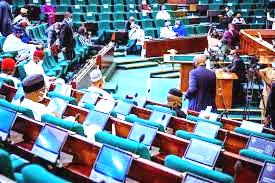The House of Representatives’ Joint Committee on Customs and Excise, Banking and Currency has given the Ministry of Finance, Budget, and National Planning; Central Bank of Nigeria; and the Nigeria Customs Service, as well as other relevant stakeholders two weeks to reconcile their differences over the electronic valuation and invoicing policy recently introduced in the import and export chain.

The CBN had introduced the e-valuation and e-invoicing system in the import and export system in order to enhance revenue generation
At the investigative hearing held by the committee in Abuja on Thursday, the CBN, NCS and the Manufacturers Association of Nigeria differed on the policy, forcing the lawmakers to ask them to meet and harmonise their differences within two weeks.
After presentations by the invited parties, a member of the House committee, Sada Soli, recalled the motion leading to the resolution by the House to investigate the matter, at the plenary on January 27, 2022.
Soli said in part, “Going by the resolution of the House, we had three prayers read on the floor of the House and the House commissioned this joint committee to look at the issues raised on the floor of the House.
“One of the issues was to urge the CBN to suspend the policy in order to enable adequate sensitisation on the workability of the policy in all ports of entry including seaports, airports, and border stations.
“The third prayer was to ask the CBN to give a 90 days’ timeline for subsequent new fiscal and monetary policy implementation to allow adjustment in order to stabilise the economy.”
The lawmaker stated that the committee was to bring the stakeholders together to resolve the issues with the policy.
He stated, “Nobody is against this policy because what I understood from the presentation of the CBN is that the crux of this policy is to remove fraudulent requests for foreign exchange on non-existing trade and overall reduction on slippage. That is the key issue.
“There is a lot of fraud going on in this country with respect to importation and exportation of goods in this country. We need to nip this in the bud. That is the issue the CBN commissioned a study to look at how to save our foreign reserves.
“We know some people are short-changing some of the weak policies we have in this country. The CBN has no issues with trading but to tighten our fiscal policy. So, the issue is to bring them together. If they have not sat down to agree on one or two issues, let us bring them together; let the Customs and the Ministry of Finance and the CBN go and sit down on the same template and bring a common position to this committee.”
Seconding the motion, John Dyegh, stated that the roundtable should report back within two weeks. “We cannot allow these agencies to keep disagreeing among themselves,” he stated.
The Chairman of the House Committee on Customs and Excise, Leke Abejide, stated that “this policy remains suspended until when we come back and then conclude.”
On his part, the Chairman of the House Committee on Banking and Currency, Victor Nwokolo, also stated that there must be cohesion in government.
Read Also: We’ve Reduced Insecurity In Gulf Of Guinea By 80% – NIMASA
According to him, the aim of the CBN is to check leakages of foreign exchange.
Nwokolo said, “How do we make the common man feel that they have a government? How do we make them have confidence in our economy? Inasmuch as there are leakages here and there in our foreign reserves, we are dealing with the common man. The whole idea is ‘how do we generate revenue?’ The issue is quite interwoven.
“Please we want to appeal that the Ministry of Finance must be part and parcel of this meeting. This matter must be resolved. If the Finance Ministry was here, they would be able to shed light on these grey areas. But whatever it is, there must be cohesion. It is critical.
“Let us avoid what has kept Nigeria where we are; where one agency is fighting another agency. There must be sensitisation for people to know. We agree with MAN that the time frame was not sufficient. Therefore, let us not do anything that would throw people out of jobs.”
The House, following the adoption of Abejide’s motion, which led to the probe, had asked the CBN to suspend the policy, warning that it might negatively affect revenue collection by the Nigeria Customs Service.
Kindly like us on Facebook















